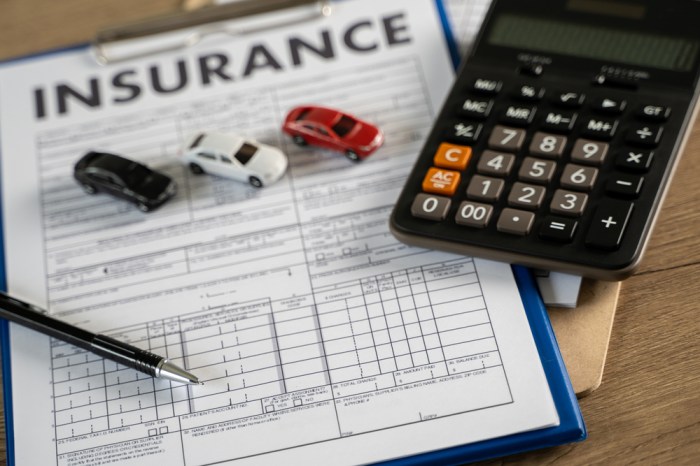What is a car insurance policy? It’s a contract between you and an insurance company that provides financial protection in the event of an accident or other covered event. By understanding the different types of coverage available, you can choose the policy that best meets your needs and ensures peace of mind on the road.
This comprehensive guide will delve into the key components of a car insurance policy, explore the various types of coverage, and provide tips on selecting the right policy for your unique situation. Whether you’re a new driver or an experienced motorist, this resource will empower you with the knowledge to make informed decisions about your car insurance.
Definitions and Key Components of a Car Insurance Policy
A car insurance policy is a contract between you and an insurance company that provides financial protection in the event of an accident or other covered incident involving your vehicle. It helps cover the costs of damages, injuries, and other expenses related to the accident, up to the limits specified in the policy.
The main components of a typical car insurance policy include:
Coverage Types
Car insurance policies offer various coverage options, each designed to protect against specific types of risks. Common coverage types include:
- Liability coverage:Covers damages or injuries caused to others in an accident you are at fault for.
- Collision coverage:Covers damages to your own vehicle in an accident, regardless of fault.
- Comprehensive coverage:Covers damages to your vehicle caused by non-collision events, such as theft, vandalism, or natural disasters.
- Uninsured/underinsured motorist coverage:Covers damages or injuries caused by drivers who are uninsured or underinsured.
Deductibles
A deductible is the amount you pay out-of-pocket before your insurance coverage kicks in. Choosing a higher deductible can lower your insurance premiums, but it also means you will have to pay more in the event of a claim.
Premiums, What is a car insurance policy
The premium is the amount you pay to the insurance company for your coverage. Premiums are typically calculated based on factors such as your driving history, age, location, and the type of coverage you choose.
A car insurance policy is a contract between you and an insurance company that provides financial protection in the event of an accident. It covers damages to your vehicle, as well as injuries to yourself and others. The cost of car insurance varies depending on a number of factors, including your age, driving history, and the type of car you drive.
For more information on how much car insurance costs, visit How much does car insurance cost .
Types of Car Insurance Coverage
Car insurance policies provide a range of coverage options to protect drivers and their vehicles in various situations. These coverages can be broadly categorized into the following types:
Liability Coverage
- Protects the policyholder from financial responsibility for injuries or damages caused to other parties in an accident.
- Includes coverage for bodily injury and property damage.
Collision Coverage
- Covers damages to the policyholder’s own vehicle in an accident, regardless of fault.
- Reimburses the policyholder for repair or replacement costs.
Comprehensive Coverage
- Provides coverage for damages to the policyholder’s vehicle caused by non-collision events, such as theft, vandalism, or natural disasters.
- May also include additional coverages, such as rental car reimbursement.
Personal Injury Protection (PIP)
- Covers medical expenses and lost wages for the policyholder and their passengers, regardless of who is at fault in an accident.
- Provides financial support during the recovery period.
The cost of different coverage options varies based on factors such as the driver’s driving history, the type of vehicle being insured, and the policyholder’s chosen deductible (the amount the policyholder pays out-of-pocket before insurance coverage kicks in).
How to Choose the Right Car Insurance Policy

Navigating the world of car insurance can be daunting, but understanding your options and assessing your needs will empower you to make an informed decision. Here’s a comprehensive guide to help you choose the right car insurance policy:
Begin by evaluating your risk factors. Consider your driving history, the type of vehicle you drive, and where you live. These factors influence your insurance premiums.
A car insurance policy is a contract between you and an insurance company that provides financial protection in the event of an accident or other covered event. There are different types of car insurance policies available, including comprehensive car insurance.
Comprehensive car insurance provides coverage for damage to your car caused by events such as theft, vandalism, and natural disasters. It also provides coverage for damage to your car caused by collisions with other vehicles or objects. To learn more about comprehensive car insurance, click here . A car insurance policy is an important part of owning a car, and it can help you protect yourself financially in the event of an accident.
Compare Coverage Options
Different types of coverage offer varying levels of protection. Liability insurance covers damage or injuries caused to others, while collision insurance protects your own vehicle in case of an accident. Comprehensive coverage provides protection against theft, vandalism, and other non-collision events.
Assess Your Budget
Determine how much you can afford to pay for insurance premiums. Compare quotes from multiple insurers to find the best value for money. Consider discounts and loyalty programs that can reduce your costs.
A car insurance policy is a contract between you and an insurance company. It protects you financially if you are in an accident. Uninsured motorist coverage is a type of car insurance that protects you if you are in an accident with a driver who does not have insurance.
This type of coverage can help you pay for your medical expenses, lost wages, and other damages. It is important to have uninsured motorist coverage because there are many uninsured drivers on the road. You can learn more about uninsured motorist coverage by visiting our website.
Read and Understand Policy Terms
Before signing a contract, carefully review the policy terms and conditions. Ensure you understand the coverage limits, exclusions, and deductibles. This will prevent any surprises in the event of a claim.
A car insurance policy is a contract between you and an insurance company that provides financial protection in case of an accident. While car insurance is essential, it can be expensive. Fortunately, there are many ways to get cheap car insurance, such as comparing quotes from multiple insurance companies . By following these tips, you can find the right car insurance policy at a price you can afford.
Filing a Car Insurance Claim
Filing a car insurance claim can be a stressful process, but it is important to understand the steps involved to ensure you receive the compensation you are entitled to. Here’s a guide to help you navigate the process:
First, it is crucial to report the accident to your insurance company as soon as possible. Most policies require you to report the incident within a specific time frame, so don’t delay. When reporting the accident, provide the insurance company with all the necessary details, including the date, time, location, and parties involved.
Documentation and Information Required
To process your claim, the insurance company will require certain documentation and information. This may include:
- Police report (if applicable)
- Driver’s license and insurance information for all involved parties
- Vehicle registration and ownership documents
- Photographs of the damage
- Medical records (if applicable)
- Estimate or invoice for repairs
Interacting with Insurance Adjusters
Once you have submitted your claim, an insurance adjuster will be assigned to your case. The adjuster will investigate the accident and determine the amount of compensation you are entitled to. It is important to be cooperative and provide the adjuster with all the necessary information.
However, you should also be aware of your rights and protect your interests.
Navigating the Claims Process
The claims process can take time, especially if there are disputes or complex issues involved. Here are some tips for navigating the process:
- Stay organized and keep all documentation related to your claim.
- Communicate regularly with your insurance adjuster and respond promptly to any requests.
- Be prepared to negotiate with the insurance company if you believe the settlement offer is too low.
- Consider seeking legal advice if you are having difficulty resolving your claim.
Last Recap

In conclusion, understanding what a car insurance policy entails is crucial for protecting yourself and your vehicle financially. By carefully considering the types of coverage available, assessing your risk factors, and comparing different policies, you can choose the option that provides the optimal balance of protection and affordability.
Remember, car insurance is not just a legal requirement; it’s an investment in your peace of mind and financial well-being.
FAQ Insights: What Is A Car Insurance Policy
What are the main types of car insurance coverage?
Liability, collision, comprehensive, and personal injury protection are the primary types of coverage included in most car insurance policies.
How do I determine the right amount of coverage for my needs?
Consider your driving habits, the value of your vehicle, and your financial situation when selecting the coverage limits that best suit your needs.
What factors affect the cost of car insurance?
Age, driving history, location, and the type of vehicle you drive are among the key factors that influence insurance premiums.


